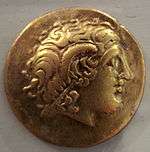Abrincatui
The Abrincatui were a Gallic tribe living in the south of the Cotentin Peninsula.[1] They became a client tribe of the Venelli until the Roman occupation in 49 BCE, when they were separated.[2]
Name
They are mentioned as Abrincatuos by Pliny (1st c. AD),[3] as Abrincatouoi (’Aβρινκάτουοι) by Ptolemy (2nd c. AD),[4] and as Abrincatis (or Abrincateni) in the Notitia Dignitatum (5th c. AD).[5][6]
The city of Avranches, attested as civitas Abrincatum in the 6th c. CE ('civitas of the Abrincatui', Abrincae ca. 550, de Avrenchis in 1055–1066), and the region of Avranchin, are named after the Gallic tribe.[1]
Geography
The territory of the Abrincatui mostly corresponded the areas of Avranchin and Mortainais. It was inherited with only slight border changes by the civitas Abrincatum and, later, by the diocese of Avranches.[7] However, the area of Mortainais was mostly uninhabited until the Roman period, and remained sparsely populated at the turn of the first millennium AD.[8]
Two pre-Roman oppida were located in Le Petit-Celland and Carolles, with other settlements in Montanel and near Mortain.[9]
References
- Nègre 1990, p. 151.
- Harry Mountain (1998), The Celtic Encyclopedia, Universal-Publishers, pp. 115–, ISBN 978-1-58112-890-1
- Pliny. Naturalis Historia, 4:107.
- Ptolemy. Geōgraphikḕ Hyphḗgēsis, 2:8:8
- Notitia Dignitatum. Abrincateni oc 5:116 and 266, 7:92; Abrincatis 37:11 and 22
- Falileyev 2010, p. entry 1007a.
- Levalet 1979, pp. 3, 15.
- Levalet 1979, pp. 14, 19.
- Levalet 1979, p. 15.
Bibliography
- Falileyev, Alexander (2010). Dictionary of Continental Celtic Place-names: A Celtic Companion to the Barrington Atlas of the Greek and Roman World. CMCS. ISBN 978-0955718236.
- Levalet, Daniel (1979). "De la cité des Abrincates au diocèse d'Avranches. 1) L'environnement archéologique". Annales de Normandie. 29 (1): 3–22. doi:10.3406/annor.1979.5313.
- Levalet, Daniel (2011). Avranches et la cité des Abrincates (Ier siècle avant J.-C.-VIIe siècle après J.-C.) recherches historiques et archéologiques. Société des antiquaires de Normandie. ISBN 978-2-919026-03-6.
- Nègre, Ernest (1990). Toponymie générale de la France (in French). Librairie Droz. ISBN 978-2-600-02883-7.CS1 maint: ref=harv (link)
